Blog Archives
Killing me softly…with this SQL
This is an old post that was on hold for several years, because I didn’t want to risk someone crashing our 11g R2 production servers with simple copy/paste from this site. In 2022 only fools still runs 11g in production, so I decided to release a test case to the public.
A few years ago I opened SR on MOS, because I considered the bug described in this blog as a serious one; basically Oracle built-in regexp functions allows anyone with a create session privilege to crash Oracle 11gR2 instance on Windows (and/or user session on Linux). Instead of fixing the bug in 11g R2, Oracle simply closed the SR as “solved” in 12c.
Well, if you have some legacy 11gR2 instance still up and running in 2022, then you can ask your DBA a question: “Do you feel lucky, punk? Do you…”;-)
With the query you’ll crash 11gR2 instance running on Windows (witouht a trace).
— We tested on 11gR2 up to and including >=BP Oct 2016.
— If you run the same query on 11gR2 on Linux (only) the user session will crash.
— Query runs fine on 10gR2 and 12cR1.
— If the query regex pattern is reduced to ~ 336 characters then even on Windows you’ll crash your user session and not the instance (with trace being generated!).
— If the query regex pattern is reduced even more, to ~ 304 characters the query will run fine without a crash.
with data as ( select 'This query will crash any 11gR2 instance on Windows and user session on Linux!' as demo from dual ) select demo, (case when regexp_substr(demo,'(\d+)G|(\d+)\sG|(\d+)G\s|(\d+)KG|(\d+)\sKG|(\d+)KG\s|(\d+)L|(\d+)\sL|(\d+)L\s|(\d+)ML|(\d+)\sML|(\d+)ML\s|(\d+)[,](\d+)G|(\d+)[,](\d+)\sG|(\d+)[,](\d+)L|(\d+)[,](\d+)\sL|(\d+)[,](\d+)KG|(\d+)[,](\d+)\sKG|(\d+)[,](\d+)ML|(\d+)[,](\d+)\sML|(\d+)[.](\d+)G|(\d+)[.](\d+)\sG|(\d+)[.](\d+)KG|(\d+)[.](\d+)\sKG|(\d+)[.](\d+)L|(\d+)[x](\d+)\sL|(\d+)[x](\d+)ML|(\d+)[.](\d+)\sML',1,1,'i') is null then 1 end) lol from data;
For those who wonder how did I come up with such regex expression, well, I did not. This regex is actually part of ETL production code; kudos goes to developer who put together this nifty little regex that determines from the data input a proper unit of […..].
I won’t tell what it does, because it’s so obvious from the code itself.
MS Access 2016 — a bug finally fixed after 16 years – NOT! (Part 2)
Only recently, I realized that I was dead wrong (two years ago), claiming that Microsoft finally fixed a bug in Microsoft Access 2016 that caused wrong results whenever we use a combination of:
- linked tables via Oracle ODBC driver,
- Oracle table contains attribute(s) with data type NUMBER(n,m),
- and Windows client OS is properly using whatever (Eastern Europe) regional settings is valid for the country. In Slovenia we’re using comma as a decimal separator.
If above requirements are met, then MS Access (any version!) interprets the decimal number as integer (2342,45 becomes 234245). This can be a potential hefty salary raise for someone.
When I reported that Microsoft finally fixed a bug, I didn’t realize that I was working on Windows 10 VirtualBox VM, where I freshly installed Oracle Client 12c, but didn’t bother to check NLS_LANG in the registry. As it is usually the case, Oracle installer puts (incorrect) NLS_LANG=AMERICAN_AMERICA.WE8MSWIN1252 in the registry, instead of correct one, NLS_LANG=SLOVENIAN_SLOVENIA.EE8MSWIN1250.
While preparing some new standard PC configuration for our current customer, I was surprised when I found out that an old bug is back. It was “back” because on this “matrix” machine Oracle client was properly setup with NLS_LANG=SLOVENIAN_SLOVENIA.EE8MSWIN1250. Since going back to 32-bit MS Office 16 and Microsoft ODBC driver for Oracle (only 32-bit version is available!) was not an option, we were left to figure out some workaround. And we did. We found out that MS Access interprets decimal data type in Oracle table correctly, if we change territory from Slovenia to America (without changing *any* other regional settings at OS level!).
Something like this:
-- open cmd, setup NLS_LANG, then run MS Access cmd> SET NLS_LANG=SLOVENIAN_AMERICA.EE8MSWIN1250 cmd> "C:\Program Files\Microsoft Office\Office16\msaccess.exe"
Changing NLS_LANG variable at registry (machine) level to SLOVENIAN_AMERICA.EE8MSWIN1250 doesn’t sound as a smart move, just for the sake of fixing a bug in one faulty product, so we decided to write some simple launcher for MS Access that can fix NLS_LANG variable behind a scene, leaving NLS_LANG in registry intact.
Below is a simple Go code that’ll run MS Access after properly setting up territory part of NLS_LANG variable. Note that we deliberately used absolute paths to MS Access binary that works for our Windows 10 standard configuration, something that you might want to change if you decide to use it. You can change language and character set part of NLS_LANG variable as well.
To build executable from the code follow these steps:
- download and install Go
- save code in some file, such as G:\SRC\runAccess.go
- compile code, open cmd and execute:
cd G:\SRC & go build - ** or, you can compile the code with:
go build -ldflags -H=windowsgui
** The alternative build with the -ldflags -H=windowsgui is optional but recommended. It will cause console window to close after it launches MS Access.
// runAccess.go -- MS Access launcher
package main
import (
"fmt"
"os"
"os/exec"
"flag"
)
func main() {
var version *bool
var help *bool
version = flag.Bool("version",false,"18.02")
help = flag.Bool("help",false,"MS Access 2016 Launcher")
flag.Parse()
if *version {
fmt.Printf("February 2018 by AlesK\nVersion %s\n", (flag.Lookup("version")).Usage)
os.Exit(0)
}
if *help {
fmt.Println("I'm here to silently run this code for a user:")
fmt.Println("cmd /c SET NLS_LANG=SLOVENIAN_AMERICA.EE8MSWIN1250 & start C:\\Program Files\\Microsoft Office\\Office16\\msaccess.exe")
os.Exit(0)
}
if (os.Args != nil && len(os.Args) > 1) {
cmd := exec.Command("cmd", "/C", "set NLS_LANG=SLOVENIAN_AMERICA.EE8MSWIN1250 & start C:/\"Program Files\"/\"Microsoft Office\"/Office16/msaccess.exe", os.Args[1])
if err := cmd.Run(); err != nil {
fmt.Println("Error: ", err)
}
} else {
cmd := exec.Command("cmd", "/C", "set NLS_LANG=SLOVENIAN_AMERICA.EE8MSWIN1250 & start C:/\"Program Files\"/\"Microsoft Office\"/Office16/msaccess.exe")
if err := cmd.Run(); err != nil {
fmt.Println("Error: ", err)
}
}
}
You can do two things with runAccess.exe. You can run it as a standalone program. It’ll open MS Access with territory part of NLS_LANG set to AMERICA. Or, you can associate *.accdb or *.mdb file extension with this launcher and it’ll correctly start MS Access if user double clicks on MS Access database file.
If you’re wondering what is perhaps a negative consequence of tweaking territory part of NLS_LANG variable, then you can refer to Oracle official NLS lang FAQ, a quote:
What does the TERRITORY component of the NLS_LANG parameter control?
The territory component of the NLS_LANG parameter controls the operation of a subset of globalization support features. It specifies conventions such as the default date, monetary, and numeric formats. Each supported territory has a unique name; for example, AMERICA , FRANCE , or CANADA . If the territory is not specified, then the value is derived from the language value.
We can certainly leave with “wrong” monetary value and having american “default date” is easy to fix with a proper NLS_DATE_FORMAT.
UPDATE: April 11, 2018
I added a small troubleshooting feature to my Golang code that allows end users to easily check if they run instance of MS Access spawned from my runAccess app. I added /cmd at the end of the command line with text NLS_TERRITORY=AMERICA. This MS Access related “command line switch” is usually read by VBA function Command(), but can also be viewed from:
File -> Options -> Client Settings -> Advanced -> Command-line arguments NLS_TERRITORY=AMERICA
package main
import (
"fmt"
"os"
"os/exec"
"flag"
)
func main() {
var version *bool
var help *bool
version = flag.Bool("version",false,"18.03")
help = flag.Bool("help",false,"MS Access 2016 Launcher")
flag.Parse()
if *version {
fmt.Printf("February 2018 by AlesK\nVersion %s\n", (flag.Lookup("version")).Usage)
os.Exit(0)
}
if *help {
fmt.Println("I'm here to silently run this code for a user:")
fmt.Println("cmd /c SET NLS_LANG=SLOVENIAN_AMERICA.EE8MSWIN1250 & start C:\\Program Files\\Microsoft Office\\Office16\\msaccess.exe /cmd NLS_TERRITORY=AMERICA")
os.Exit(0)
}
if (os.Args != nil && len(os.Args) > 1) {
cmd := exec.Command("cmd", "/C", "set NLS_LANG=SLOVENIAN_AMERICA.EE8MSWIN1250 & start C:/\"Program Files\"/\"Microsoft Office\"/Office16/msaccess.exe " + os.Args[1] + " /cmd NLS_TERRITORY=AMERICA")
if err := cmd.Run(); err != nil {
fmt.Println("Error: ", err)
}
} else {
cmd := exec.Command("cmd", "/C", "set NLS_LANG=SLOVENIAN_AMERICA.EE8MSWIN1250 & start C:/\"Program Files\"/\"Microsoft Office\"/Office16/msaccess.exe /cmd NLS_TERRITORY=AMERICA")
if err := cmd.Run(); err != nil {
fmt.Println("Error: ", err)
}
}
Please, can someone deliver some cloud “stuff” to Oracle Support?
Can you tell me what is wrong with this screen capture that I took on MOS and is part of my Service Request?
Right now, I’m waiting SR analyst to download and install Oracle software, so that he can run query provided by us. I hope that they have at least a decent bandwidth, if they’re not able to use provisioned virtual machines in the first place. And that is the same company touting their cloud offerings. LOL.
20th anniversary
When I started to work for a current employer in 1995 the company run a tiny Oracle 6 production database on IBM mainframe (OS/390). Nothing serious or big. The majority of data processing at that time was still done in Cobol and TPL. Development with Oracle*Case of the new state Business registry however started on LAN, with Oracle 7 on Netware 4. Yes. Life. Was. Exciting. Recovery from a server crash was almost a daily routine. But for a starter like me, it was definitely fun and exciting working environment.
In the mid 90’s company was using a myriad of OS’s (OS/390, Netware 3 and 4, OS/2, DOS, Windows 3.1, Windows 3.11, Windows NT 3.5, SCO Unix, IRIX….but not Windows 95!). We used two network protocols, primary one was IPX/SPX and secondary was TCP/IP (Oracle Listener was listening on IPX/SPX adapter). It was a ZOO.
After Microsoft released Windows NT 4 at the end of 1996, the decision was made to consolidate OS environment on NT 4 at every level, from laptops, desktops to the servers. With one exception. Two main file servers were left to run on Netware.
Why not Unix? Due to the lack of skilled workforce with strong Unix skills on the market it was somehow logical choice to pick a mainstream OS player.
So, on March 1997 we put our first non-mainframe production Oracle database in use. It was IBM PC Server 320 with two Pentium 133Mhz processors, a whooping 128MB of RAM and four 2GB Fast Wide SCSI disks. We run NT 4 and Oracle 7.3. Backups were done with ArcServe and HP Surestore DAT tape library. This first PC based host was (predictably) named ORANT.
At that time we were considered as weirdos (perhaps we still are?), because no one run Oracle production on Windows. Local Oracle representatives used us as a reference whenever someone asked them if anyone is using Oracle on NT or how stable Oracle is on NT. Honestly, from 1997-1999, it was not as stable as we wished to be (regular monthly reboots were needed), but it was certainly a giant leap forward compared to Oracle on Netware. The real stability came with Windows 2000/2003. Twenty years later our production still runs on Windows Servers, but this is gonna to change soon. Not because of the lack of stability (modern Windows Servers are rock solid, and we can prove it;) but because of clear Tux technology dominance and advantages in the Cloud/OSS era.
Anyway, I took a couple of screenshots from my VirtualBox guest, running Windows NT 4 (SP1) and Oracle 7.3.4:
For the record: installation of the Windows NT 4 took ~10 minutes. Installation of Oracle 7.3.4 with Replication option took another ~10 minutes (including building a database). It took 1.3GB of disk space for both OS, RDBMS and sample database. For comparison, Oracle 12c R2 ISO file with all the components is 9.7 GB.
Unicode and Oracle SQLcl…on Windows — solved
I was struggling with sqlcl on Windows 7 to properly display our umlauts (we’re using Windows 7 desktops with NLS_LANG=SLOVENIAN_SLOVENIA.EE8MSWIN1250 setup in the registry — note: sqlcl is not reading this variable).
When I read Jeff Smith blog post “Unicode and Oracle SQLcl…on Windows” I though that my problem was solved. Someone reading an article without reading the comments would assume that sqlcl works out of the box on Windows with proper UTF-8 support, which does not. Partly due to the omission of proper parameter in supplied sql.bat file, but mostly because of the state of cmd.exe (powershell.exe) in versions of Windows 7 and below, Windows 10 is much better.
In this demo we’re using Windows 7 EE (Windows 10 EE), Oracle 12c R1 and sqlcl-4.2.0.16.308.0750-no-jre.zip.
First, we created test table called UMLAUT in SQL*Developer and inserted our umlauts:
Then we run a query from this table with sqlcl. Note an extra line between the rows returned from the query….
ok, how about writing some umlauts on the command line….
Well, we can write umlauts but console won’t show us what we wrote (note a presence of squares)…nevertheless the result of the query is correct.
What we can do? Well, for a start we need to patch the officially supplied sql.bat script.
Open sql.bat and replace line
SET STD_ARGS=-Djava.awt.headless=true -Xss10M
with
SET STD_ARGS=-Djava.awt.headless=true -Xss10M -Dfile.encoding=UTF-8
But don’t celebrate yet…what we achieved is this….
We still have an extra line between the rows, which is annoying, but at least we can see what we wrote in the WHERE condition. Plus an extra square :-)…if you’re “lucky” Windows 7 user.
However, above patch is enough on Windows 10, where, both writing of umlauts and properly displaying the records (without extra blank line) works as expected….
The only “workaround” that we found for Windows 7 clients is to simply forget about official console applications (cmd.exe and powershell.exe) as a “host” for sqlcl and use some alternative. We found out that ConEMU works great…(patch in the sql.bat is of course still mandatory until sqlcl guys do this for you).
And what about the suggestion that we can tweak the registry and permanently change the console application (cmd.exe) code page to UTF? Don’t do this, because you’ll disable some non-java applications, including SQL*Plus…look what happens with sqlplus.exe….





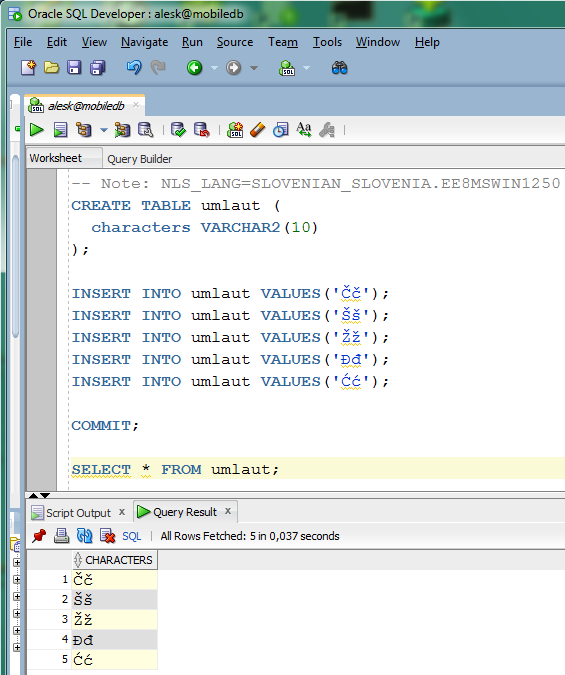
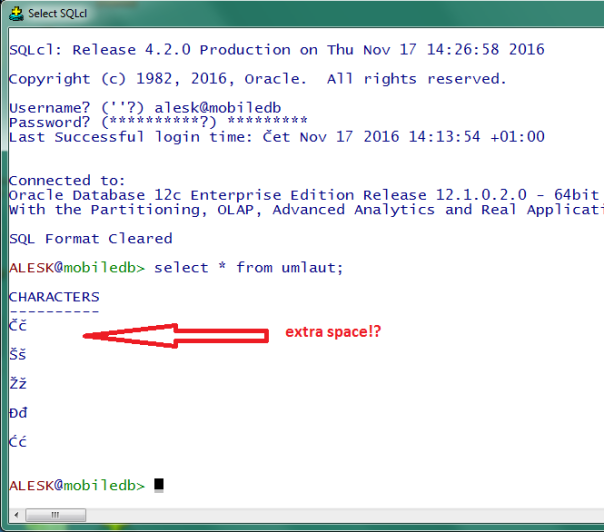
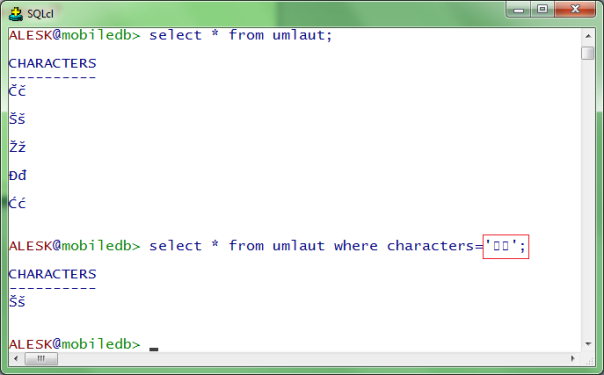
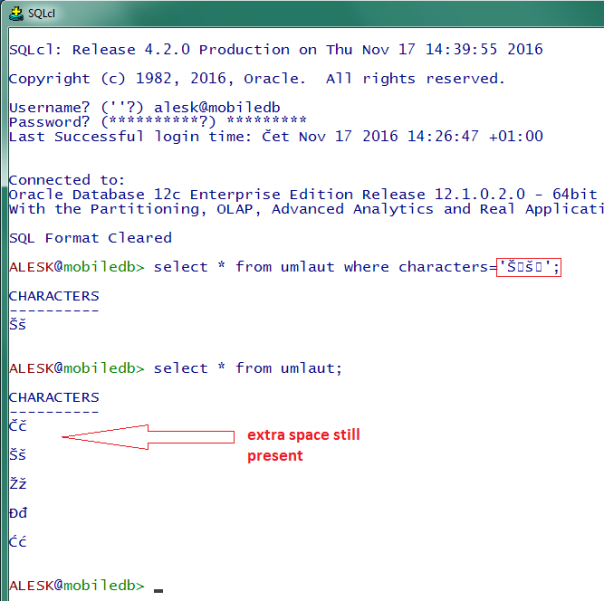
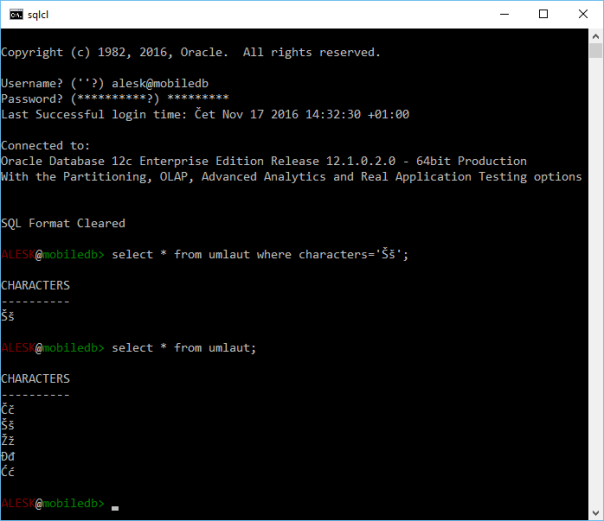
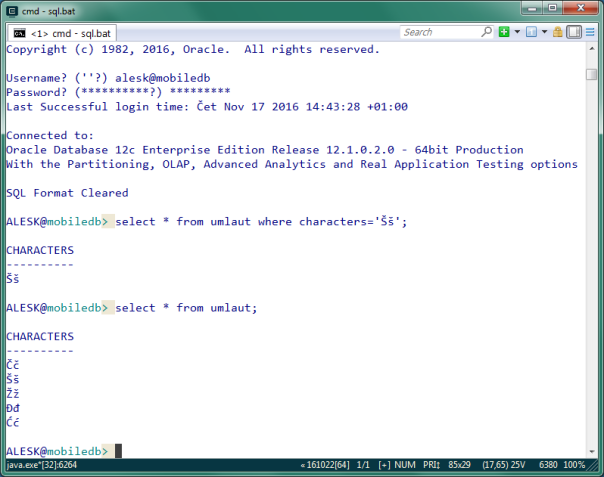
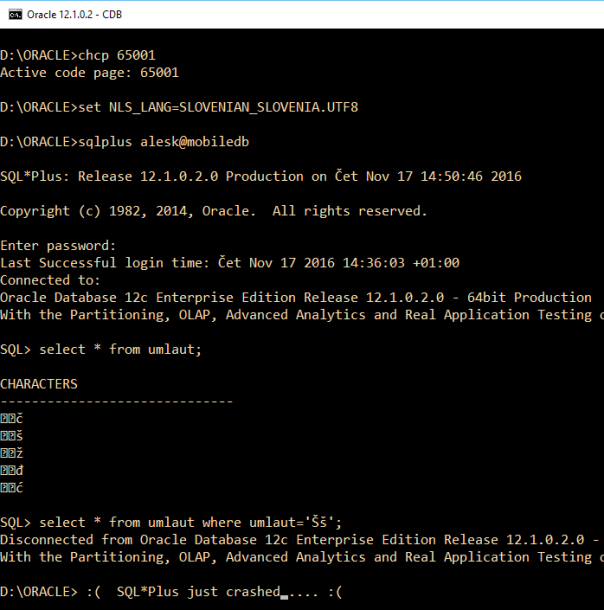
You must be logged in to post a comment.